- Iterate
- Meet The Team
- The Top 10 Startup Teams in Australia
Table of contents
A stable economy, some Government support and easy access to capital mean Australia’s startup economy is strong.

A stable economy, some Government support and easy access to capital mean Australia’s startup economy is strong.
The CSIRO ON program has helped research teams bring their ideas from the lab to the market, and the Government’s Early Stage Venture Capital Limited Partnership (ESVCLP) Policy has brought in billions of dollars in investment by offering tax incentives.
According to SmartCompany, the top 10 ESVCLP funds have been directly responsible for creating 12,500 jobs. The ON program has resulted in 52 new companies, 226 new jobs, AU$30.4 million in commercialisation grants and more than AU$36 million in investment capital.
In additional positive news, public and private investments are translating into numbers on the balance sheet. Nick Crocker, General Partner at Aussie VC firm Blackbird Ventures points out that of companies founded by Australians since 2011, there are 52 worth more than AU$100 million, 14 worth more than AU$500 million and six are worth more than AU$1 billion.
These 52 companies are the perfect snapshot of the Australian startup ecosystem.
They represent a combined Enterprise Value (EV) of over AU$30 billion, and 10,000 new jobs. The list also shows Australia’s strengths in the fintech and SaaS space. Of the 52 companies, 29% are fintechs, and 35% are SaaS companies, contributing AU$12 billion and AU$6.5 billion in EV, respectively. And, most of these companies are staying home, with 75% headquartered in Australia.
This good news on the local front is tempered slightly by performance on a global scale. In the 2019 annual Startup Genome Global Startup Ecosystem Report, Sydney lost ground in the top 30 rankings, and while there is overall growth, Australia is lagging behind global trends.
The Melbourne ecosystem is on the rise and has the potential to crack the top 30 in 2020, but Sydney’s fall from the list is cause for some concern.
“This result is disappointing, but it’s not a surprise. In 2015, Australia’s leading ecosystem Sydney was 16th in the world. That slipped to 17th in 2017. Now, after some years in the political wilderness, the rest of the world is overtaking us,” StartupAUS CEO Alex McCauley said.
“Reports like this remind us that local growth is great, but this is a global race with very real prize money and lots of competitors. We need consistent, long-term support to ensure we’re a genuine contender.”
So, with that local and global context in mind, let’s see which Australian startup teams are leading the charge for that prize money.
1. Assembly Payments

Like so many startups, Assembly Payments was created by entrepreneurs seeking a solution to a problem they all experienced in day-to-day life. Tired of the difficulty in collecting payments for their various businesses, co-founders, Simon Lee, Darren McMurtie, Simon Jones and Victor Zheng came together to create a simple, multi-channel payment system.
The technology means businesses can accept and disburse payments in a variety of ways. They can also monitor these various payments from a singular source.
Assembly Payments General Manager, Platforms, Tim Dickinson points out talent and government instability as the key challenges facing startups.
“Launching a business in Australia can present its own challenges. While the talent situation has improved in Australia over the past few years, it can still be difficult to track down the right person for certain jobs,” said Tim.
“Change in government and policy can also pose a challenge. There is no consensus from the Government on the role of startups in the economy, our ecosystem is often lumped in with small business in terms of its relevance to policymakers.”
“This means there is no strategy to cultivate the ecosystem on a national level, and all the policies that startups leverage are open to change depending on the political agenda of the day.”
Let’s hope political instability doesn’t stop future companies, like Assembly Payments, from making the leap from concept to commercialisation.
2. Envato
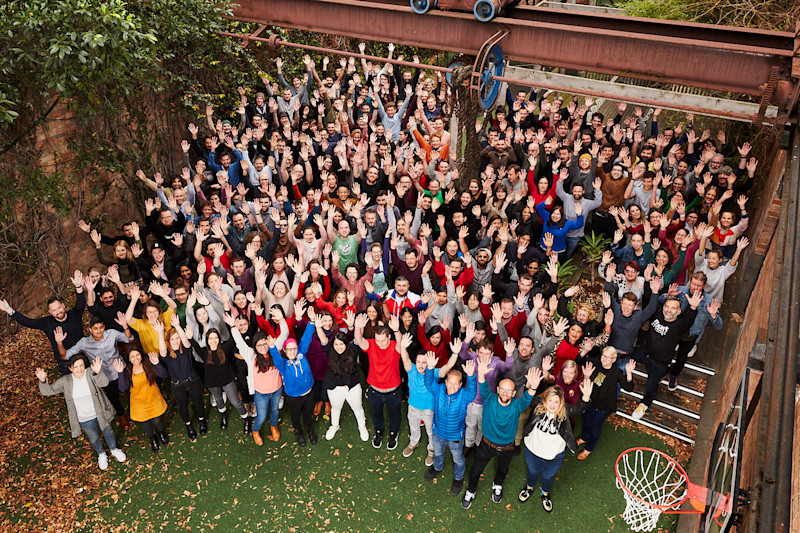
Envato is a success story of staggering proportions. This bootstrapped startup has moved from a Bondi garage to a digital assets company worth over AU$1 billion. Collis, Cyan and Vahid Ta’eed, as well as other co-founder Jun Rung, are the only shareholders in the company showing that sticking together may just be the secret to growth. They’ve also proven that you don’t need VC backing to make a big splash.
Since its inception in 2006, Envato has helped the creatives working within its marketplaces earn over US$600 million. They’ve set a goal to reach a US$1 billion payout for its creative community, and they’re well and truly on track.
Like Assembly Payments, the biggest challenge facing Envato is finding talent. Startups need access to talent pipelines if they are going to meet growth trajectories. Unfortunately, this talent isn’t always available, especially when it comes to developers.
To address this problem, Envato has backed the LaunchVic ScaleUP campaign. This campaign is aimed at linking job hunters with startups and scaleups looking for their particular talent.
In an economy reeling from the aftershock of the Coronavirus, startups could become a major supplier of jobs, making initiatives like these invaluable.
Rapid expansion hasn’t come at the expense of team culture. In fact, Envato has placed an increased emphasis on making the company a great place to work. As a company that values purpose as much as profit, they put the right people in the right places and give them an objective to believe in.
The results? Envato has featured in the Great Place To Work survey for the past 6 years.
3. Afterpay
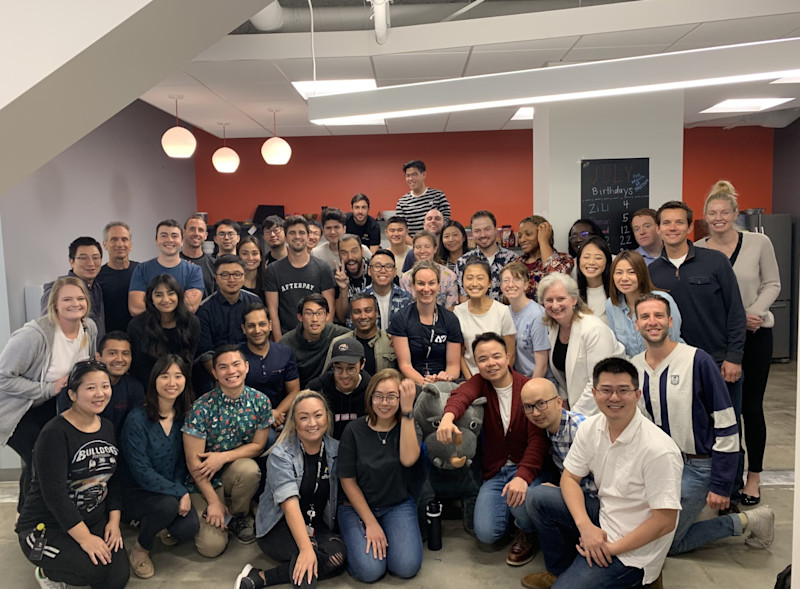
Afterpay employs over 500 staff across Australia, New Zealand, the US and the UK. It is a leading member of the buy now pay later (BPNL) sector, which is turning consumer credit on its head by offering an alternative to the traditional, high-cost options like credit cards.
Afterpay works as an instalment service. So, if consumers pay each instalment on time, the service is entirely free. Fees for payments are also capped, making Afterpay a transparent form of credit. Instead of relying on customers making late payments, Afterpay makes most of its profit by taking a set percentage of each transaction from partnered merchants.
Today, Afterpay has over 3 million customers in Australia and New Zealand, more than 3 million in the US and 500,000 in the UK. It also partners with over 30,000 Australian merchants, making it responsible for the processing of more than 10% of all online retail purchases for physical goods. It is estimated that more than 17% of Australia’s purchasing population has used Afterpay.
Founders Nick Molnar and Anthony Eisen are still active in the company, With Eisen acting as CEO and Managing Director and Nick Molnar performing Global Chief Revenue Officer and Executive Director roles.
In a meaningful sign of solidarity, Afterpay has also positioned itself as a champion of the Australian startup and fintech industries. It submitted the Financial Technology and Regulatory Technology report to the Australian Senate, encouraging the Australian Government to continue and improve its support to these industries.
4. Power Ledger

Power Ledger is doing some inspiring work. Mixing blockchain technology with a push for more renewable forms of energy, Power Ledger is really tapping into the zeitgeist, and the results are impressive. They managed to raise AU$34 million by selling their cryptocurrency token POWR in 2017, and they also received a AU$2.5 million grant to deliver a Smart Cities trial in the Western Australian city of Fremantle.
Co-founders Dr Jemma Green and John Bulich are pioneers in their respective fields. Dr Green championed sustainability and corporate social responsibility during her time at JP Morgan, while John was a leading force in bringing blockchain technology to Australia.
Power Ledger’s proprietary software is blockchain-enabled, making energy transactions more efficient, and renewable energy investment more accessible.
The company works across energy trading, environmental commodities trading and renewable asset ownership. All transactions are recorded in the blockchain making the trade secure and transparent.
“Support for research and development and the start up sector in Australia is well established, with governments, industry and the education sector all contributing financially as well as culturally – they are believers who have come to understand the sector’s needs,” said Dr Jemma Green - co-founder and Chairman of Power Ledger.
"However, the investor climate is challenging simply because Australian investors generally either don't understand the aims and challenges of the tech sector, or they are impatient with its long-term need for support to produce breakthrough products. This is changing however, as more Australian tech companies like Atlassian and Canva prove the viability of digital businesses amid the traditional mix. ”
Dr Green also wants Australia to take some inspiration from tech superpowers, “Australia needs to foster a culture of innovation like that found in tech superpowers like the United States where new ideas, agile thinking and long term development are embraced rather than looked at with suspicion. Tech is a frontier that Australia can lead the way in exploring, but we need to find our sense of adventure and not get stuck in our old ways.”
5. 99designs

99designs has an incredible origin story. A group of designers engaged in some friendly competition on the SitePoint forum. In 2008, the designers decided to turn that competition into a design marketplace - 99designs. This marketplace now contains a global community of artists that have earned over US$300 million.
The platform allows clients to find the perfect designer by looking after the briefing process. That means each brief is matched with the right designer. It also looks after payments and even ensures that all design copyrights are transferred to the owner once the project is complete.
Partners are now even tapping into 99designs’ API technology, community and marketplace expertise to navigate creative bottlenecks for their own customers. A key example is Squarespace, who have used 99design infrastructure to match customers with relevant experts and launch a new creative ecosystem around their core product.
99designs company HQ is in Melbourne, but they also have offices in Oakland, California and Berlin. The company has focused on creating a ‘people first’ culture to ensure expansion doesn’t come at the cost of the people that have made 99designs’ success possible.
“One of our guiding principles is to create a collaborative and fulfilling workplace. We believe in putting people first, and in people helping people create their own success - within our own team, as well as for our clients and designer community, said [Patrick Llewellyn] (https://theorg.com/org/99designs/team/patrick-llewellyn "Patrick Llewellyn"), CEO of 99designs.
“Anyone who’s started a business knows how significant it is to see your brand come to life for the first time, and our designers make this journey a reality for founders all over the world. It’s a really special moment that we’re lucky enough to see happen every single day, and then grow into strong working relationships between clients and designers on the platform."
Another diverse team who have shown the value of investing in your people. We love the fact that they have put their team front and centre on their website because it really is the people that make the company.
6. uno.
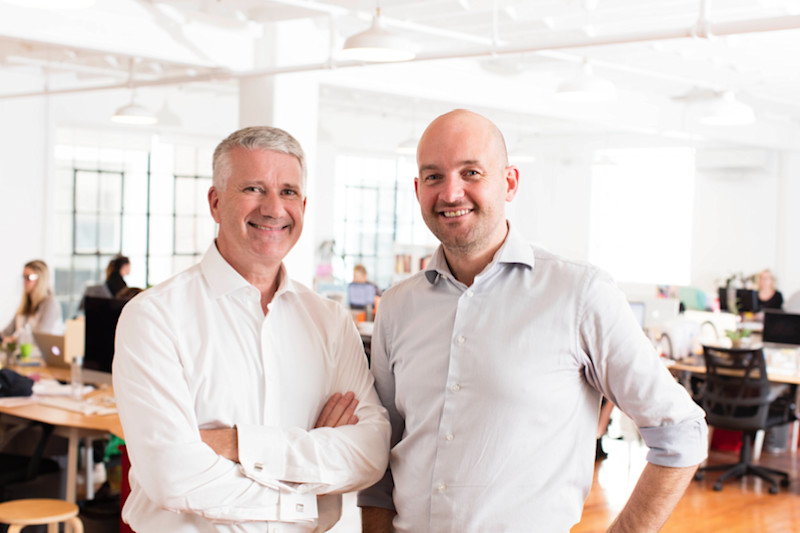
uno. is dedicated to helping people get more value out of their homes by ensuring Australians get the best value out of their mortgage. Founder and Chief Innovation Officer Vincent Turner decided to found the company after working in the fintech industry throughout Australia and in Silicon Valley.
This startup differs from other mortgage brokers by being Australia’s first Active Home Loan Manager. With unique loanScore technology, uno. continues to analyse loan prices after settlement. That way, if a better deal pops up, one of uno.’s brokers can help organise a renegotiation.
The uno. team is also one of the most diverse on our list, and we’re looking forward to seeing how they shake up the housing market.
7. Canva
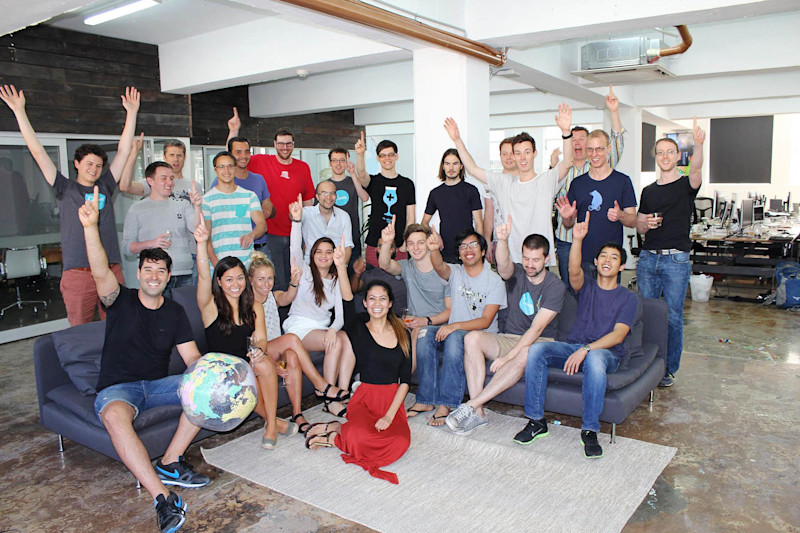
Canva has built its success on offering straightforward, drag and drop software that lets users make their own graphic designs.
Melanie Perkins came up with the idea for Canva in 2007 while she was in university. She was tutoring other students how to use complicated graphic design software like InDesign and decided there must be a better way. First, she teamed up with Cliff Obrecht and launched their first business together to test the idea for a much simpler, more collaborative online design software. Fusion Books is a software platform that students used to design their school yearbooks - they started out niche to prove this new approach to design was possible and needed. After it kept growing for a few years Melanie and Cliff decided they were ready to broaden it out and tackle the whole design space. Cameron Adams soon joined the team to provide the technical expertise they needed, and Canva was officially launched to the public in 2013.
Canva now has a team of over 900 people, made up of engineers, product managers, marketers, customer service and of course, designers, and so much more. They’ve got a diverse and passionate team, and they even have two in-house chefs.
Maybe the secret to start-up success is sitting around a table and sharing good food?
It’s certainly working for Canva, and with more and more businesses going online, the need for easy graphic design solutions is only going to increase.
8. GO1
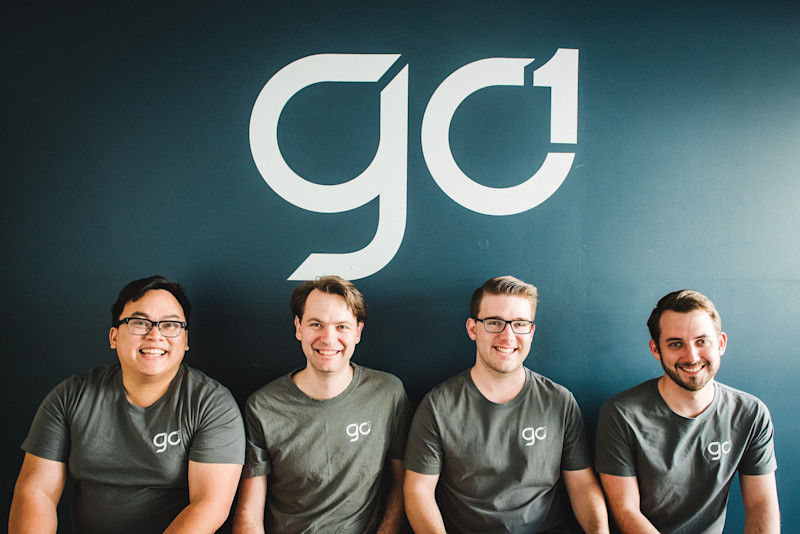
GO1 started in Brisbane, with the four co-founders hatching the plan in a garage. A snap decision to apply for the prestigious Y-Combinator accelerator took GO1 from a garage to the world stage.
The company is now a leading provider of online learning and education for some of the largest companies in the world.
Co-founders Andrew Barnes, Chris Eigeland, Chris Hood and Vu Tran are all still heavily involved in their business. The COVID-19 crisis has transformed the way we think about work, and as working from home goes from a perk to BAU, the boys from GO1 are going to be even busier.
9. Prospa
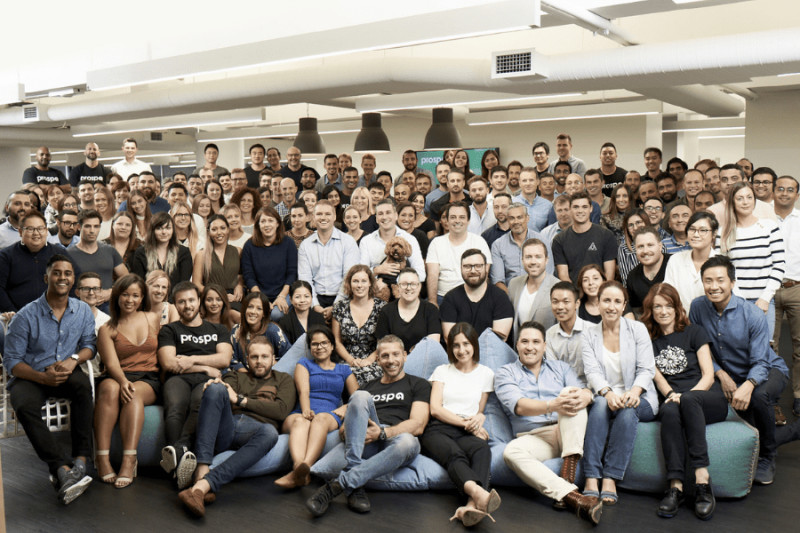
Prospa specialises in online loans for small businesses. It has done so well in this space that it is now Australia's number one small business lender. Small businesses can access up to AU$300,000 in loans and have funding in 24-hours. Since opening, Prospa has financed 26,000 SMEs, which adds up to more than AU$1.4 billion in funding.
Prospa is also playing a pivotal role in the Coronavirus crisis. Prospa is part of the Federal Government’s Coronavirus SME Guarantee Scheme and has been given AU$223 million to offer unsecured funding and 6-month repayment holidays to small businesses in need.
Co-founders Greg Moshal and Beau Bertoli combine fintech and start-up experience. The founders were jointly awarded Fintech Leader of the Year in 2017 and have also won the NSW Pearcey Tech Entrepreneur of the Year Special Recognition award.
Greg and Beau are the perfect leaders to help Prospa navigate this difficult time and their creation will be invaluable in helping countless Australian businesses.
10. Xinja Bank
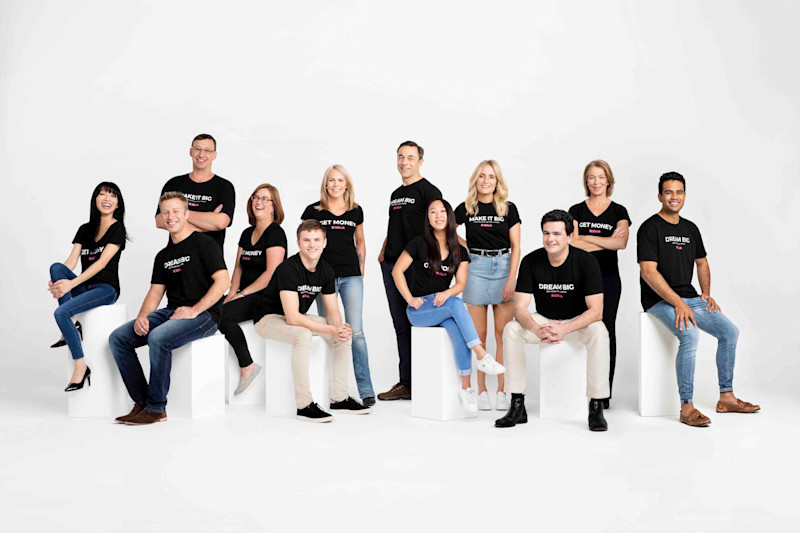
The rise of the neobank is well and truly underway in Australia, and Xinja is leading the charge. Monzo has been an unmitigated success in the UK, and Xinja’s digital-only, user-centric approach is a promising sign of similar success (they even have the co-founder of Monzo on their board).
CEO, Eric Wilson was inspired by his father-in-law, who worked as a bank manager in regional Australia. The bank manager used to be a trusted source of information, so Eric decided to use mobile technology to replicate the role of the trusted bank manager and make the banking experience more personal.
The Xinja team is diverse, and they have a commitment to working towards 50% female representation on their board of advisors. They share their profits with their team and have a commitment to an open and honest workplace where everyone is accountable, and hierarchies are no excuse for power-trips.
Our favourite thing about Xinja? The publically-available roadmap. Users love feeling like they’re part of the journey, and what better way than giving them access to the project management board?
So, that’s our list of the top 10 startup teams in Australia. Some of them are well on their way to becoming giants in their own industry. An impressive feat considering it wasn’t so long ago that they were going through the teething problems and growing pains that all startups go through.
They pushed through, invested in their people, and now they’re reaping the rewards.
Australia is about to face its most significant economic challenge. The economy was lucky enough to get through the 2008 GFC relatively unscathed, but the current crisis will hurt businesses of all sizes.
“Much like the rest of the globe, COVID-19 has sent the startup ecosystem into a bit of disarray. In some ways, it has brought the community closer together, but many founders are fighting to keep their business afloat against very difficult and compounding circumstances,” said Tim Dickinson, Assembly Payments.
Let’s hope the community continues to band together, and that State and Federal Governments offer transparent support networks for startups. If these companies are supported in their infancy, they go on to create jobs, and that’s exactly what Australia needs right now.
In fact, existing startups are crying out for talent to add to their teams.
What do you think about our list?
Do you know any companies that belong on this list? Do you have a startup you think we should know about? Do you want to fill out your own org chart? Please send your comments, suggestions and feedback to hello@theorg.com.
In this article


The ORG helps
you hire great
candidates
Free to use – try today